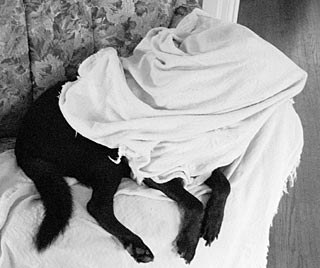| | 
- 18 September 2006
- No. 1,280 (cartoon)
- I wish you’d tell me what you’re thinking.
No you don’t. 
- 19 September 2006
- Art Makes Scents
- Years ago I pondered the possibility of a smell museum. After reading a feature in a recent issue of New Scientist, it looks like smell may finally be a practical new medium in which to work.
Researchers at the Tokyo Institute of Technology claimed they’re concocting a set of ninety-six machine-reproducible, elemental scents, from which any odor may be created. That sounds very plausible to me; I always find numbers divisible by twelve to be quite scientific. According to my computer, that means I could generate 7.92282E+28 smells. Since I don’t know what that means except that it’s a Very Big Number, I’ll repeat what I read in the article, “almost any odor, from old fish to gasoline.” I wonder why the scientists didn’t use a more inviting example. If I were looking for investors, I’m promise to recreate any smell from your first kiss to a November moonrise above the tree line at Mount Rainier. I’m looking forward to getting a set of those ninety-six chemicals and adding one more, Bunnahabhain. Et voilà, 1.58456E+29! That will be the last time anyone will call my work scentsless! 
- 20 September 2006
- Fields Far from Academia
- Helen Mazinski, a self-described “film buff” from Ottowa, Canada, wrote to inform me that the W. C. Fields anecdote I cited a few months ago was “... just plain wrong. Had you bothered to check your facts, or known the first thing about his filmography, you would have realized the lines you misquoted were from one of his masterpieces. I’ll leave it to you to do the research after the fact.”
I could find the alleged facts, but I can’t imagine how citations and footnotes could make a good story any better. I suppose that’s one of a myriad reasons that I’m far from academia. And vice-versa. 

- 21 September 2006
- American Raw Power (Sketch)
- The other day—31 July, actually—I became entranced with the exposed electrical sockets in an old San Francisco warehouse. The more I studied the grid of orifices, the more visually appealing I found them. All of a sudden I came up with the title for a new piece, American Raw Power. Now all I have to do is make the work.
In preparation for the piece, I photographed the socket to have a sketch to work from later. Or perhaps not; I’ve yet to follow up on any of the other sketches I’ve published in this notebook: And Now It’s Neither, Scenario for an Embarrassment, and Not Parallel. One thing I can predict is that a number of viewers will look at these sketches and note that I didn’t use a pen and/or pencil and/or brush for any of them. Oh well, sketches aren’t what they used to be. 

- 22 September 2006
- An Insufferable, Spoiled, Prima Donna Brat
- After he finished his breakfast, Ben begged to eat mine as well. For the umteenth time this morning, he’s being inescapably obnoxious in yet another wasted try to get everything he wants.
“Ben,” I asked, “Do you know why you’re like an insufferable, spoiled, prima donna brat? Ben looked at me blankly as a string of foamy saliva dripped from his mouth. Of course he didn’t know why; he’s an insentient, miserable, oily dog. I put a blanket over the wretched cur’s head so that I didn’t have to look at his pathetic visage. Feh redux! 
- 23 September 2006
- The Amazing Amanda McKittrick Ros
- I successfully avoided almost all formal education in grammar and literature, and so I was something of a tabula rasa in those areas when I met Maia in my early twenties. She wielded a big syntax stick, and repeatedly whapped me up ’side the head to good effect.
I remember one time when she described my writing as, “illiterative.” After I complained that it wasn’t that bad, Maia explained that she said, “alliterative.” I remembered that story today when I read that Amanda McKittrick Ros (1860-1939), perhaps one of the most prolific alliterators ever, was being honored at an Irish literary festival. And rightly so; what other great writer has come up with names like Helen Huddleston and Delia Delaney? And of course, there’s the title character of her first novel, Irene Iddesleigh, who suffers from unrequited love in an ill-fated marriage. Here’s an exemplary sentence from that first novel. The living sometimes learn the touchy tricks of the traitor, the tardy and the tempted; the dead have evaded the flighty earthy future and form to swell the retinue of retired rights, the righteous school of the invisible and the rebellious roar of the raging nothing.
- In addition to her novels, Ros penned volumes of poetry, including Poems of Puncture and Fumes of Formation. Here are the opening lines to her poem, Visiting Westminster Abbey.
Holy Moses! Have a look!
Flesh decayed in every nook!
Some rare bits of brain lie here,
Mortal loads of beef and beer,
Some of whom are turned to dust,
Every one bids lost to lust;
Royal flesh so tinged with ‘blue’
Undergoes the same as you.
- [Personally, I think her poems compare favorably to those of self-described “Poet / Artist / Composer” C. John Taylor.]
She was well-known in the literary circles of her time, but not for the best of reasons. A group of Oxford luminaries—including C.S. Lewis and J.R.R. Tolkien—once held a contest to see who could read her work for the longest period of time without laughing. Ros held her critics in contempt, and referred to them as “auctioneering agents of Satan,” “evil-minded snapshots of spleen,” and, in one memorable salvo, a “clay crab of corruption.” Ros, who was as modest as she was talented, once boasted, “I expect I will be talked about at the end of a thousand years.” With writing like that, I believe that’s a reasonable expectation. 
last weak | index | next weak
©2006 David Glenn Rinehart
| |

